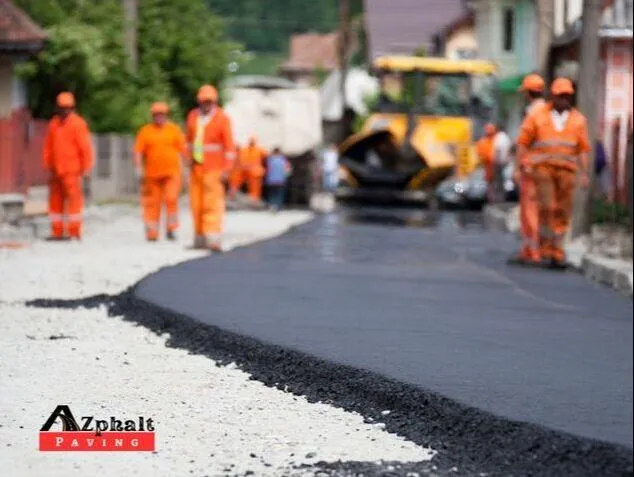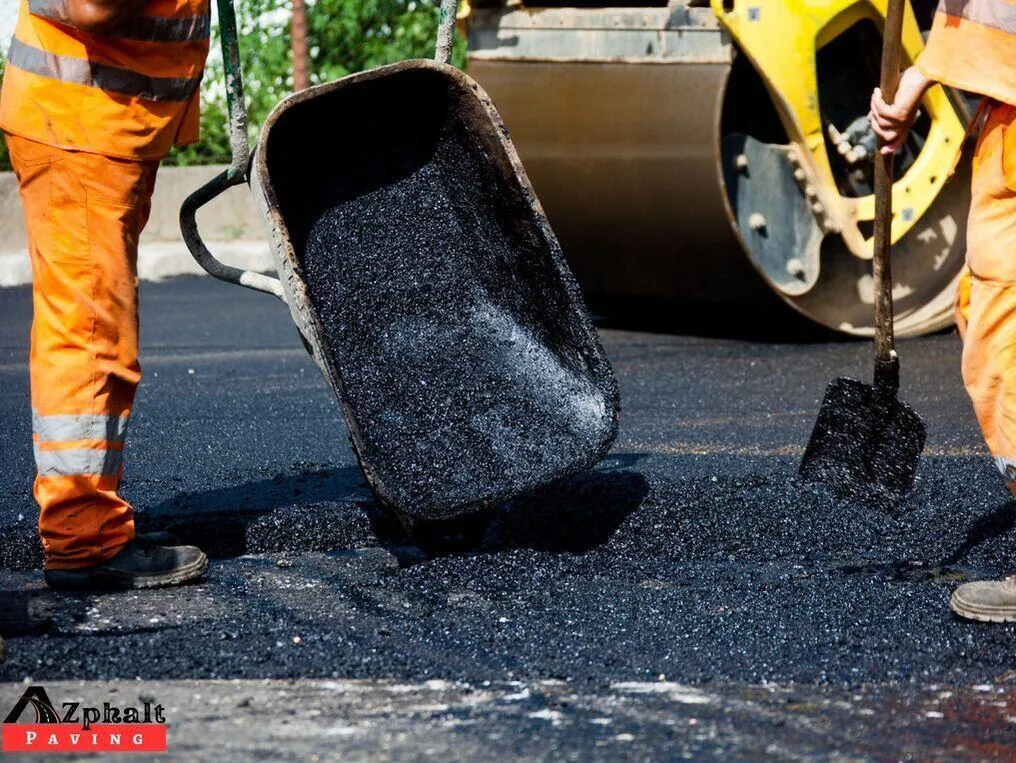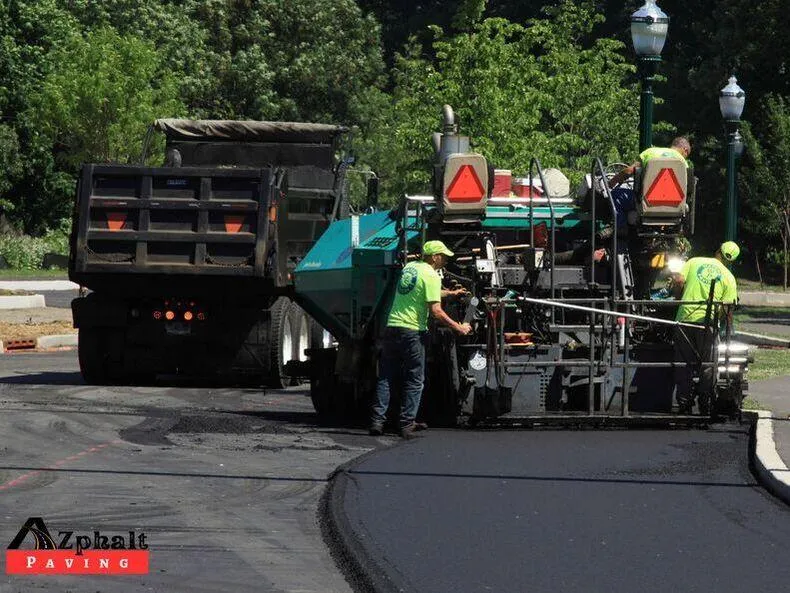Asphalt Paving of Arizona
Arizona's Premiere Paving
AZphalt Paving Company is the top provider of asphalt paving services in Arizona, proudly serving Phoenix, Gilbert, Chandler, Mesa, Queen Creek, and surrounding areas. Contact us for a free quote! [email protected]
The Importance of Asphalt Paving in Arizona
In today's society, roads play an important role in increasing people's, products', and services' mobility. Asphalt road surfaces have contributed significantly to the progress and continue to contribute to socio-economic development. They have a number of advantages, including cost-effectiveness, noise reduction, and comfort. The benefits for both road users and the environment can be improved by using asphalt materials in road pavement and maintenance. When it comes to your asphalt needs, reach out to an Arizona asphalt company like us.




The Advantages of Asphalt Pavement
Asphalt's advantages simply add up to a higher value. Safe, smooth, and long-lasting is asphalt. It can be built to last for a long time. Asphalt is easy to install and maintain, and asphalt contractors are well-versed in how to navigate construction zones. The green pavement is asphalt, which is up to a hundred percent recyclable. recyclable. Asphalt is also the only option for a long-lasting pavement because of its versatility and modern technology. There are a number of reasons why asphalt has become the most popular type of road paving material, and to ensure the proper installation, an Arizona asphalt company is the best place to turn to. The majority of roads are built in layers, with each layer contributing to the greatest possible infrastructure. When asphalt pavement is used, it has a number of advantages that everyone can profit from.
The Durability of Surface. When properly built, asphalt pavements have the ability to live indefinitely. Anything that is utilized on a regular basis needs to be maintained on a regular basis. The same may be said for our roadways. Maintenance may be done quickly and without disrupting traffic if asphalt is used.
Long Term Use. The use of asphalt on our roads can contribute to the road's long-term viability by improving the ride quality and fuel consumption of automobiles.
Smooth and Safe Surface. A smoother surface is provided by asphalt pavement. Because a smooth surface prevents damage to the pavement, fewer repairs are required. Asphalt is a wonderful affordable choice since it improves fuel efficiency and lowers vehicle wear and tear.
Reduced Noise. Finally, using asphalt to pave roads and highways minimizes the amount of noise generated by the tire/pavement interface, resulting in a more pleasant driving experience for motorists.
What Are the Different Types of Asphalt?
Asphalt is utilized on 94 percent of all paved roads in the United States because it is one of the most recycled and reused kinds of pavement available. Asphalt, on the other hand, isn't all made equal. It is wise to trust an Arizona asphalt company for your next paving project. The kind of asphalt you drive on is determined by its chemical structure and other factors. Homeowners and contractors can choose from a variety of asphalt paving options. What is the best kind for your project? Below, you'll learn about five different forms of asphalt pavement.
Hot mix is a 300°F-heated mixture of roughly 95 percent stone, sand, or gravel held together by asphalt cement.
Warm mix does not cool as quickly as hot mix because it is mixed and sent at a lower temperature. It has emulsions in it that make it much easier to mix and distribute.
The most cost-effective asphalt mix is the cold mix, which does not require heating. Potholes and cracks in the pavement are repaired using it.
Cut-back asphalt is made up of a mixture of asphalt cement and a petroleum solvent that has a lower viscosity (thickness) than regular asphalt. It is forbidden in many regions because it includes volatile compounds.
Mastic asphalt is a waterproof medium made up of a dense and long-lasting composition. It's a hot-mixed mixture of asphalt, stone filler, and mineral powder that's heated and blended.
What Are The Features of Asphalt Pavement
The necessity of a well and secure parking lot is often overlooked and taken for granted. The parking lot is a major source of revenue for your company, and if it is destroyed, it might turn clients away. There are many various paving alternatives to choose from when it comes to paving your parking lot. Asphalt is among the most well-known alternatives. It has the following features:
It is friendly to travelers and business friendly. Asphalt roads don't require a lot of work on the ground or a lot of time to cure, and traffic may start as soon as the roller is done. They can be paved one lane at a time, decreasing congestion and limiting interruption to citizens while also saving the government hundreds of dollars in user delays;
It is eco-friendly. The most recyclable product in America is asphalt, which is 100 percent recyclable. Every year, the asphalt sector recycles and reuses 100 million metric tons of asphalt, saving taxpayers approximately $2 billion. In addition, compared to alternative paving materials, asphalt uses 20 percent less energy to manufacture and construct;
It is safe. Asphalt pavements are resistant to skidding and have a strong color contrast with road signs, allowing drivers to see more clearly on the road in any conditions. The black hue of asphalt, which is unaffected by ice and snow chemicals, lowers glare and melts ice and snow faster than other pavement kinds;
It has a smooth surface. Asphalt provides a more consistent surface than other types of pavements. Because uneven, uneven surfaces make drivers fatigued and lose control, smooth highways are safer;
It is a cost-effective option. In addition to being safer, smooth roads save money. Vehicle running costs are lower because there are less bumps in the road, which reduces vehicle wear and tear. In addition, enhancing the smoothness of a roadway by 25% can increase its longevity by up to 10%, saving taxpayers money;
It improves the look and attractiveness. An asphalt pavement starts with a fantastic curb appeal, and many days are spent constructing aesthetically beautiful infrastructure. A new road is an investment in our towns' aesthetics as well as our inhabitants' safety.
It is highly durable. Pavements made of asphalt are long-lasting. As long as the asphalt pavements are flexible and bridging, they should be able to sustain occasional overburdening without causing major damage. They can be made to fit any traffic, soil, or material requirements.
What Are Asphalt Properties and Uses
Bitumen, as a binding agent, and inert minerals like sand, gravel, and crushed rock make up a significant component of asphalt. It has a blackish-brown appearance and can be solid at low temperatures or liquid at temperatures above 50 degrees Celsius. In many places of the world, asphalt can be found in nature as natural deposits, as well as being manufactured artificially. Let's have a look at how it works and how it can be used. Here are some of the asphalt's technical characteristics:
An odorless property Asphalt is a non-dissolving, water-repellent substance having a lightweight structure. It is also waterproof because of its high plasticity, adhesive strength, and binding strength with granular material.
The viscosity of asphalt is a property that shows how the components in it make it difficult for it to flow. The viscosity of asphalt is also a reflection of its hardness and density. Varying phases of asphalt have varied in different indexes at room temperature.
Whenever an external force is applied to the asphalt, it deforms without breaking, and when the external force is removed, the ductility of the asphalt is retained.
Temperature sensitivity refers to the fact that the viscosity and flexibility of asphalt alter as the temperature rises. Asphalt is a polymer that does not include any crystals. The melting point of asphalt, but on the other hand, is variable and deforms as that of the temperature changes.
The ability of asphalt to withstand long-term aging in a diverse climate of heat, sunlight, and air is known as its atmospheric stability. In the atmosphere's comprehensive setup, low molecular groups will be transformed into polymeric groups, and the resin will turn into ground bitumen at a much quicker rate than the oil properties into the resin.
What Are the Uses of Asphalt?
On highways, interstates, and roads, the hot mix is dispersed and rolled. A warm mix is suitable for tunnels and days when the air quality is poor. It could also be used on roads and highways. Contractors utilize trimmed asphalt for tack coats, fog seals, slurry coats, and as a stability element in mixes, whereas mastic asphalt is employed in constructing and waterproofing for rooftops and subterranean storage, and it even outlasts the surrounding pavement. Here are some key points to remember about asphalt paving in Arizona:
It is easy to maintain and very sustainable. Asphalt may be maintained on a regular basis to increase its life. Small fractures might emerge over time, and the asphalt's deep black hue can degrade to a dark gray with time. Not to be concerned. Sealing your asphalt surfaces can help to solve this problem
It improves the value of your property. Commercial asphalt paving services, like any other enhancement, can help you increase the value of your property. Whether you're planning to sell or lease your home, the improved curb appeal and benefits of commercial paving services will help you increase sales and employee happiness.
It is really affordable. Business owners frequently have to pick among asphalt and concrete when upgrading or building commercial paving. One of the most common elements that influence that decision is the budget. While the exact cost of commercial asphalt services varies depending on your location, the current market price of supplies, and the amount of preparation work required for appropriate installation, asphalt is usually less expensive than concrete in terms of cost.